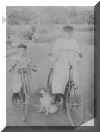Heckscher State Park Estates
George C. Taylor Estate
Never in the history of the State of New York has the acquisition of land for park purposes had such far reaching results as did the establishment of Heckscher State Park at East Islip.
It was the subject of actions in every possible court from the County Court of Suffolk County to the Supreme Court of the United States and involved twenty-five separate appellate proceedings.
It was the cause of a special summer session of the State legislature.
It held up the expenditure of park funds throughout the entire state for nearly a year.
It was instrumental in changing the route of a parkway more than thirty miles away.
It was the subject of mass meetings printed pamphlets, newspaper campaigns and finally, it was indirectly responsible for the making of a new political figure.
The property involved in the controversy having these far-reaching results was formerly the George C. Taylor Estate of 1500 acres on the Great South Bay in the Town of Islip. It was wild and picturesque property with a wild and picturesque history.
George C. Taylor, who assembled this large tract had been an unusual and eccentric man of considerable means. In 1886 he built there a large and ornate country home. He then erected about 30 other buildings, such as carriage barn, stables, dairy barns, greenhouses, and quarters for his employees, etc. The wooded areas of the estate he stocked with deer and game-birds.
For proper effect he had __cocks and a herd of elks wandering about the lawns of the mansion. Inside he displayed seven cupid-like statues of himself, supposedly representing the seven ages of man.
The
George C. Taylor estate of 1500 acres was the site of the original Wm. Nicoll Manorhouse.
George C. Taylor's life at his Islip Estate was far from what the good people of the local
community considered normal. He isolated
himself on the estate with a common-law wife. Their
daughter was rarely seen off the private grounds. They hired special tutors and instructors for her and when the bicycle
craze came along, they imported a bicycle instructor from England, who brought with him
all available models of English-made bicycles. They
had also constructed a special bicycle house for storing and repairing' the newly acquired
equipment. The outcome of these activities
was that the girl who had been so zealously guarded unexpectedly ran off and was married
to her bicycle instructor by a local Justice of the Peace.
This
may or may not have contributed to George C. Taylor's
eccentricities. In any event, he and his
companion became heavy drinkers according to local residents.
At times the winding staircase in the three-story mansion became hard to navigate
so he had an elevator installed. Other tales
relate how he built a log cabin not far from the mansion where he kept his liquor stores
and where he slept after one of his frequent quarrels with his wife.
This
wild gossip which had kept the locality excited for so long a time came to an end in 1908
when George C. Taylor and his wife died within a few days of each other.
(Excerpted from "History of the Long
Island State Parks" by Chester R. Blalock, Long Island State
Park Commission.) and The Long Island Forum
Taylor Mansion Horse Barn (Still there) Aerial View of Mansion from Windmill
Mansion after renovations/before demolition in 1933
Greenway Family (George C. Taylor's Stableman and Chauffeur)
Greenway House Greenway Children Chauffer and Carriage
J. Neale Plumb Estate
This is the Central part of the Plumb building which was moved to Main St. in Bayshore and is now on the Historic Register
UNDER CONSTRUCTION










